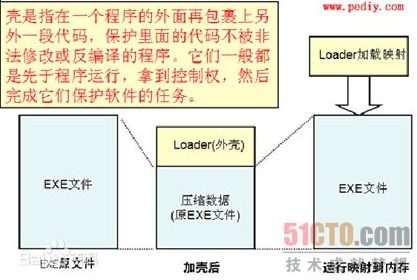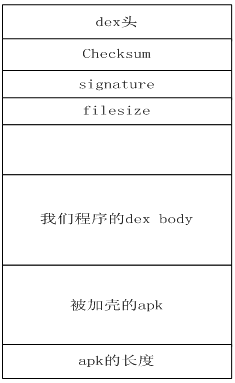android apk 防止反编译技术第一篇-加壳技术
做android framework方面的工作将近三年的时间了,现在公司让做一下android apk安全方面的研究,于是最近就在网上找大量的资料来学习。现在将最近学习成果做一下整理总结。学习的这些成果我会做成一个系列慢慢写出来与大家分享,共同进步。这篇主要讲apk的加壳技术,废话不多说了直接进入正题。
一、加壳技术原理
所谓apk的加壳技术和pc exe的加壳原理一样,就是在程序的外面再包裹上另外一段代码,保护里面的代码不被非法修改或反编译,在程序运行的时候优先取得程序的控制权做一些我们自己想做的工作。(哈哈,跟病毒的原理差不多)
PC exe的加壳原理如下:

二、android apk加壳实现
要想实现加壳需要解决的技术点如下:
(1)怎么第一时间执行我们的加壳程序?
首先根据上面的原理我们在apk中要想优先取得程序的控制权作为android apk的开发人员都知道Application会被系统第一时间调用而我们的程序也会放在这里执行。
(2)怎么将我们的加壳程序和原有的android apk文件合并到一起?
我们知道android apk最终会打包生成dex文件,我们可以将我们的程序生成dex文件后,将我们要进行加壳的apk和我们dex文件合并成一个文件,然后修改dex文件头中的checksum、signature 和file_size的信息,并且要附加加壳的apk的长度信息在dex文件中,以便我们进行解壳保证原来apk的正常运行。加完壳后整个文件的结构如下:

(3)怎么将原来的apk正常的运行起来?
按照(2)中的合并方式在当我们的程序首先运行起来后,逆向读取dex文件获取原来的apk文件通过DexClassLoader动态加载。
具体实现如下:
(1)修改原来apk的AndroidMainfest.xml文件,假如原来apk的AndroidMainfest.xml文件内容如下:
1. <application
2. android:icon="@drawable/ic_launcher"
3. android:label="@string/app_name"
4. android:theme="@style/AppTheme" android:name="com.android.MyApplication" >
5. </application>
修改后的内容如下:
1. <application
2. android:icon="@drawable/ic_launcher"
3. android:label="@string/app_name"
4. android:theme="@style/AppTheme" android:name="com.android.shellApplication" >
5. <meta-data android:name="APPLICATION_CLASS_NAME" android:value="com.android.MyApplication"/>
6. </application>
com.android.shellApplication这个就是我们的程序的的application的名称,而
7. <meta-data android:name="APPLICATION_CLASS_NAME" android:value="com.android.MyApplication"/>
是原来的apk的application名称。
(2)合并文件代码实现如下:
?
|
1
2
3
4
5
6
7
8
9
10
11
12
13
14
15
16
17
18
19
20
21
22
23
24
25
26
27
28
29
30
31
32
33
34
35
36
37
38
39
40
41
42
43
44
45
46
47
48
49
50
51
52
53
54
55
56
57
58
59
60
61
62
63
64
65
66
67
68
69
70
71
72
73
74
75
76
77
78
79
80
81
82
83
84
85
86
87
88
89
90
91
92
93
94
95
96
97
98
99
100
101
102
103
104
105
106
107
108
109
110
111
112
113
114
115
116
117
118
119
120
121
122
123
124
125
126
|
public
class
ShellTool {
/**
* @param args
*/
public
static
void
main(String[] args) {
// TODO Auto-generated method stub
try
{
File payloadSrcFile =
new
File(
"payload.apk"
);
//我们要加壳的apk文件
File unShellDexFile =
new
File(
"classes.dex"
);
//我们的程序生成的dex文件
byte
[] payloadArray = encrpt(readFileBytes(payloadSrcFile));
byte
[] unShellDexArray = readFileBytes(unShellDexFile);
int
payloadLen = payloadArray.length;
int
unShellDexLen = unShellDexArray.length;
int
totalLen = payloadLen + unShellDexLen +
4
;
byte
[] newdex =
new
byte
[totalLen];
//添加我们程序的dex
System.arraycopy(unShellDexArray,
0
, newdex,
0
, unShellDexLen);
//添加要加壳的apk文件
System.arraycopy(payloadArray,
0
, newdex, unShellDexLen,
payloadLen);
//添加apk文件长度
System.arraycopy(intToByte(payloadLen),
0
, newdex, totalLen-
4
,
4
);
//修改DEX file size文件头
fixFileSizeHeader(newdex);
//修改DEX SHA1 文件头
fixSHA1Header(newdex);
//修改DEX CheckSum文件头
fixCheckSumHeader(newdex);
String str =
"outdir/classes.dex"
;
File file =
new
File(str);
if
(!file.exists()) {
file.createNewFile();
}
FileOutputStream localFileOutputStream =
new
FileOutputStream(str);
localFileOutputStream.write(newdex);
localFileOutputStream.flush();
localFileOutputStream.close();
}
catch
(Exception e) {
// TODO Auto-generated catch block
e.printStackTrace();
}
}
//直接返回数据,读者可以添加自己加密方法
private
static
byte
[] encrpt(
byte
[] srcdata){
return
srcdata;
}
private
static
void
fixCheckSumHeader(
byte
[] dexBytes) {
Adler32 adler =
new
Adler32();
adler.update(dexBytes,
12
, dexBytes.length -
12
);
long
value = adler.getValue();
int
va = (
int
) value;
byte
[] newcs = intToByte(va);
byte
[] recs =
new
byte
[
4
];
for
(
int
i =
0
; i <
4
; i++) {
recs[i] = newcs[newcs.length -
1
- i];
System.out.println(Integer.toHexString(newcs[i]));
}
System.arraycopy(recs,
0
, dexBytes,
8
,
4
);
System.out.println(Long.toHexString(value));
System.out.println();
}
public
static
byte
[] intToByte(
int
number) {
byte
[] b =
new
byte
[
4
];
for
(
int
i =
3
; i >=
0
; i--) {
b[i] = (
byte
) (number %
256
);
number >>=
8
;
}
return
b;
}
private
static
void
fixSHA1Header(
byte
[] dexBytes)
throws
NoSuchAlgorithmException {
MessageDigest md = MessageDigest.getInstance(
"SHA-1"
);
md.update(dexBytes,
32
, dexBytes.length -
32
);
byte
[] newdt = md.digest();
System.arraycopy(newdt,
0
, dexBytes,
12
,
20
);
String hexstr =
""
;
for
(
int
i =
0
; i < newdt.length; i++) {
hexstr += Integer.toString((newdt[i] &
0xff
) +
0x100
,
16
)
.substring(
1
);
}
System.out.println(hexstr);
}
private
static
void
fixFileSizeHeader(
byte
[] dexBytes) {
byte
[] newfs = intToByte(dexBytes.length);
System.out.println(Integer.toHexString(dexBytes.length));
byte
[] refs =
new
byte
[
4
];
for
(
int
i =
0
; i <
4
; i++) {
refs[i] = newfs[newfs.length -
1
- i];
System.out.println(Integer.toHexString(newfs[i]));
}
System.arraycopy(refs,
0
, dexBytes,
32
,
4
);
}
private
static
byte
[] readFileBytes(File file)
throws
IOException {
byte
[] arrayOfByte =
new
byte
[
1024
];
ByteArrayOutputStream localByteArrayOutputStream =
new
ByteArrayOutputStream();
FileInputStream fis =
new
FileInputStream(file);
while
(
true
) {
int
i = fis.read(arrayOfByte);
if
(i != -
1
) {
localByteArrayOutputStream.write(arrayOfByte,
0
, i);
}
else
{
return
localByteArrayOutputStream.toByteArray();
}
}
}
}
|
(3)在我们的程序中加载运行原来的apk文件,代码如下:
?
|
1
2
3
4
5
6
7
8
9
10
11
12
13
14
15
16
17
18
19
20
21
22
23
24
25
26
27
28
29
30
31
32
33
34
35
36
37
38
39
40
41
42
43
44
45
46
47
48
49
50
51
52
53
54
55
56
57
58
59
60
61
62
63
64
65
66
67
68
69
70
71
72
73
74
75
76
77
78
79
80
81
82
83
84
85
86
87
88
89
90
91
92
93
94
95
96
97
98
99
100
101
102
103
104
105
106
107
108
109
110
111
112
113
114
115
116
117
118
119
120
121
122
123
124
125
126
127
128
129
130
131
132
133
134
135
136
137
138
139
140
141
142
143
144
145
146
147
148
149
150
151
152
153
154
155
156
157
158
159
160
161
162
163
164
165
166
167
168
169
170
171
172
173
174
175
176
177
178
179
180
181
182
183
184
185
186
187
188
189
190
191
192
193
194
195
196
197
198
199
200
201
202
203
204
205
206
207
|
public
class
shellApplication
extends
Application {
private
static
final
String appkey =
"APPLICATION_CLASS_NAME"
;
private
String apkFileName;
private
String odexPath;
private
String libPath;
protected
void
attachBaseContext(Context base) {
super
.attachBaseContext(base);
try
{
File odex =
this
.getDir(
"payload_odex"
, MODE_PRIVATE);
File libs =
this
.getDir(
"payload_lib"
, MODE_PRIVATE);
odexPath = odex.getAbsolutePath();
libPath = libs.getAbsolutePath();
apkFileName = odex.getAbsolutePath() +
"/payload.apk"
;
File dexFile =
new
File(apkFileName);
if
(!dexFile.exists())
dexFile.createNewFile();
// 读取程序classes.dex文件
byte
[] dexdata =
this
.readDexFileFromApk();
// 分离出解壳后的apk文件已用于动态加载
this
.splitPayLoadFromDex(dexdata);
// 配置动态加载环境
Object currentActivityThread = RefInvoke.invokeStaticMethod(
"android.app.ActivityThread"
,
"currentActivityThread"
,
new
Class[] {},
new
Object[] {});
String packageName =
this
.getPackageName();
HashMap mPackages = (HashMap) RefInvoke.getFieldOjbect(
"android.app.ActivityThread"
, currentActivityThread,
"mPackages"
);
WeakReference wr = (WeakReference) mPackages.get(packageName);
DexClassLoader dLoader =
new
DexClassLoader(apkFileName, odexPath,
libPath, (ClassLoader) RefInvoke.getFieldOjbect(
"android.app.LoadedApk"
, wr.get(),
"mClassLoader"
));
RefInvoke.setFieldOjbect(
"android.app.LoadedApk"
,
"mClassLoader"
,
wr.get(), dLoader);
}
catch
(Exception e) {
// TODO Auto-generated catch block
e.printStackTrace();
}
}
public
void
onCreate() {
{
// 如果源应用配置有Appliction对象,则替换为源应用Applicaiton,以便不影响源程序逻辑。
String appClassName =
null
;
try
{
ApplicationInfo ai =
this
.getPackageManager()
.getApplicationInfo(
this
.getPackageName(),
PackageManager.GET_META_DATA);
Bundle bundle = ai.metaData;
if
(bundle !=
null
&& bundle.containsKey(
"APPLICATION_CLASS_NAME"
)) {
appClassName = bundle.getString(
"APPLICATION_CLASS_NAME"
);
}
else
{
return
;
}
}
catch
(NameNotFoundException e) {
// TODO Auto-generated catch block
e.printStackTrace();
}
Object currentActivityThread = RefInvoke.invokeStaticMethod(
"android.app.ActivityThread"
,
"currentActivityThread"
,
new
Class[] {},
new
Object[] {});
Object mBoundApplication = RefInvoke.getFieldOjbect(
"android.app.ActivityThread"
, currentActivityThread,
"mBoundApplication"
);
Object loadedApkInfo = RefInvoke.getFieldOjbect(
"android.app.ActivityThread$AppBindData"
,
mBoundApplication,
"info"
);
RefInvoke.setFieldOjbect(
"android.app.LoadedApk"
,
"mApplication"
,
loadedApkInfo,
null
);
Object oldApplication = RefInvoke.getFieldOjbect(
"android.app.ActivityThread"
, currentActivityThread,
"mInitialApplication"
);
ArrayList<Application> mAllApplications = (ArrayList<Application>) RefInvoke
.getFieldOjbect(
"android.app.ActivityThread"
,
currentActivityThread,
"mAllApplications"
);
mAllApplications.remove(oldApplication);
ApplicationInfo appinfo_In_LoadedApk = (ApplicationInfo) RefInvoke
.getFieldOjbect(
"android.app.LoadedApk"
, loadedApkInfo,
"mApplicationInfo"
);
ApplicationInfo appinfo_In_AppBindData = (ApplicationInfo) RefInvoke
.getFieldOjbect(
"android.app.ActivityThread$AppBindData"
,
mBoundApplication,
"appInfo"
);
appinfo_In_LoadedApk.className = appClassName;
appinfo_In_AppBindData.className = appClassName;
Application app = (Application) RefInvoke.invokeMethod(
"android.app.LoadedApk"
,
"makeApplication"
, loadedApkInfo,
new
Class[] {
boolean
.
class
, Instrumentation.
class
},
new
Object[] {
false
,
null
});
RefInvoke.setFieldOjbect(
"android.app.ActivityThread"
,
"mInitialApplication"
, currentActivityThread, app);
HashMap mProviderMap = (HashMap) RefInvoke.getFieldOjbect(
"android.app.ActivityThread"
, currentActivityThread,
"mProviderMap"
);
Iterator it = mProviderMap.values().iterator();
while
(it.hasNext()) {
Object providerClientRecord = it.next();
Object localProvider = RefInvoke.getFieldOjbect(
"android.app.ActivityThread$ProviderClientRecord"
,
providerClientRecord,
"mLocalProvider"
);
RefInvoke.setFieldOjbect(
"android.content.ContentProvider"
,
"mContext"
, localProvider, app);
}
app.onCreate();
}
}
private
void
splitPayLoadFromDex(
byte
[] data)
throws
IOException {
byte
[] apkdata = decrypt(data);
int
ablen = apkdata.length;
byte
[] dexlen =
new
byte
[
4
];
System.arraycopy(apkdata, ablen -
4
, dexlen,
0
,
4
);
ByteArrayInputStream bais =
new
ByteArrayInputStream(dexlen);
DataInputStream in =
new
DataInputStream(bais);
int
readInt = in.readInt();
System.out.println(Integer.toHexString(readInt));
byte
[] newdex =
new
byte
[readInt];
System.arraycopy(apkdata, ablen -
4
- readInt, newdex,
0
, readInt);
File file =
new
File(apkFileName);
try
{
FileOutputStream localFileOutputStream =
new
FileOutputStream(file);
localFileOutputStream.write(newdex);
localFileOutputStream.close();
}
catch
(IOException localIOException) {
throw
new
RuntimeException(localIOException);
}
ZipInputStream localZipInputStream =
new
ZipInputStream(
new
BufferedInputStream(
new
FileInputStream(file)));
while
(
true
) {
ZipEntry localZipEntry = localZipInputStream.getNextEntry();
if
(localZipEntry ==
null
) {
localZipInputStream.close();
break
;
}
String name = localZipEntry.getName();
if
(name.startsWith(
"lib/"
) && name.endsWith(
".so"
)) {
File storeFile =
new
File(libPath +
"/"
+ name.substring(name.lastIndexOf(
'/'
)));
storeFile.createNewFile();
FileOutputStream fos =
new
FileOutputStream(storeFile);
byte
[] arrayOfByte =
new
byte
[
1024
];
while
(
true
) {
int
i = localZipInputStream.read(arrayOfByte);
if
(i == -
1
)
break
;
fos.write(arrayOfByte,
0
, i);
}
fos.flush();
fos.close();
}
localZipInputStream.closeEntry();
}
localZipInputStream.close();
}
private
byte
[] readDexFileFromApk()
throws
IOException {
ByteArrayOutputStream dexByteArrayOutputStream =
new
ByteArrayOutputStream();
ZipInputStream localZipInputStream =
new
ZipInputStream(
new
BufferedInputStream(
new
FileInputStream(
this
.getApplicationInfo().sourceDir)));
while
(
true
) {
ZipEntry localZipEntry = localZipInputStream.getNextEntry();
if
(localZipEntry ==
null
) {
localZipInputStream.close();
break
;
}
if
(localZipEntry.getName().equals(
"classes.dex"
)) {
byte
[] arrayOfByte =
new
byte
[
1024
];
while
(
true
) {
int
i = localZipInputStream.read(arrayOfByte);
if
(i == -
1
)
break
;
dexByteArrayOutputStream.write(arrayOfByte,
0
, i);
}
}
localZipInputStream.closeEntry();
}
localZipInputStream.close();
return
dexByteArrayOutputStream.toByteArray();
}
// //直接返回数据,读者可以添加自己解密方法
private
byte
[] decrypt(
byte
[] data) {
return
data;
}
|
根据上面的讲述相信大家对apk的加壳技术有了一定的了解,下一篇我们将讲解另一种android apk防止反编译技术,期待大家的捧场。如果对这篇讲的技术有任何疑问及想要获得这篇文章讲的技术的工程源码
欢迎关注个人微信公众平台:程序员互动联盟(coder_online),扫一扫下方二维码或搜索微信号coder_online即可关注,我们可以在线交流。
